Sage Health Benefits and Uses
Is it for flavouring your favourite dishes? Is it a powerful healer for the body and mind? Or is it something a bit more mystical?
Sage: The Ancient Herb with Modern Vibes
Sage has been a companion to humanity for ages—used to clear negative energy, soothe ailments, and spice up our meals. Whether you’re drawn to its earthy taste, its natural wellness benefits, or its use in ancient rituals, sage has a lot to offer.
What makes this herb so beloved? Maybe it’s the way a few leaves can transform a meal into something special. Maybe it’s the calming touch it brings to the body when you need it most. Or maybe it’s simply the timeless magic it holds.
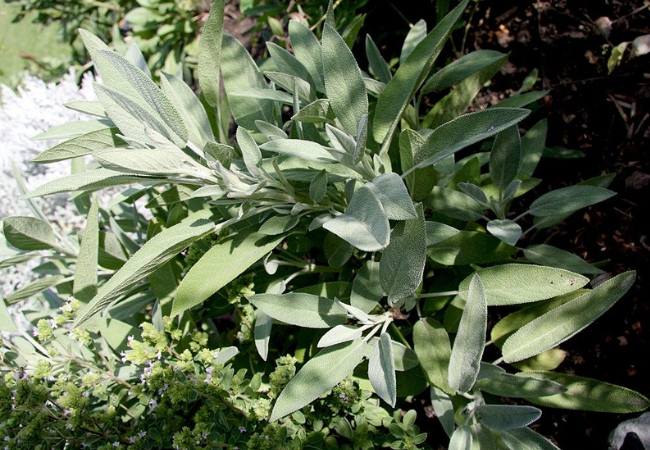
Whatever the reason, sage isn’t just a herb—it’s a story, an experience, and a tradition that still finds its way into our modern lives. So let’s explore what makes this herb so essential, and how it can add a little extra wisdom to your daily routine.
Sage: A Legacy!
Salvia: More Than Just Sage
There are about 500 species of Salvia. Spanish sage is the most familiar culinary variety and does not contain thujone. Close relatives are dan shen and clary sage.
- Common Sage (Salvia officinalis) contains thujone, which has health benefits but can be toxic in high doses, affecting the nervous system. Use it in cooking, but be cautious with medicinal uses.
- Spanish Sage (Salvia lavandulifolia) is thujone-free—perfect for teas and remedies without the risks.
- Clary Sage (Salvia sclarea) is great in aromatherapy, offering calming benefits without thujone.
Sage belongs to the Salvia family, derived from the Latin word salvare, meaning “to heal.” This gives a big clue about its historical significance. For centuries, sage was considered essential for keeping both the body and spirit healthy—often called “the saviour herb” by herbalists.
From the ancient Egyptians using sage for fertility rituals to medieval monks brewing sage-infused teas to calm the mind, this humble plant has a storied past that’s all about healing and harmony (and let’s not forget how Native American cultures turned to sage for smudging rituals to cleanse and purify energy—something that continues today in homes around the world!).
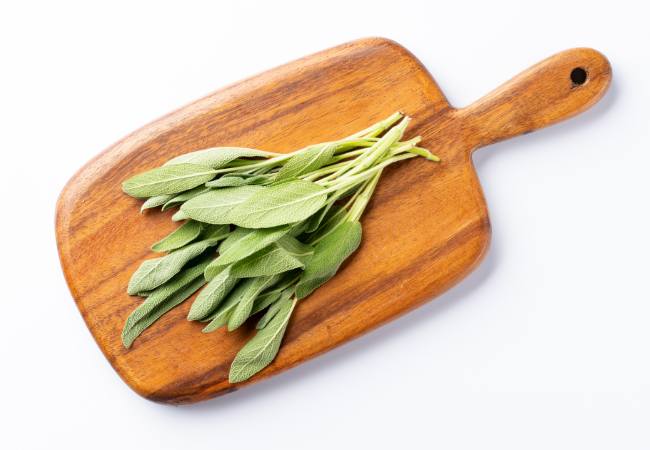
Sage’s history is rich, but its uses are simple: a healer, a purifier, and a friend in times of need. Ready to see how sage can find its place in your life today?
Salvia officinalis (Lamiaceae), commonly known as sage, has a bitter, astringent taste. The leaves and essential oil are used, containing up to 2% volatile oils (including cineole, thujone, and camphor), along with diterpene bitters, triterpenes, flavonoids, phenolic acids like rosmarinic acid, tannins, oestrogenic substances, salvin, and carnosic acid. Sage is valued for its antiseptic, astringent, anti-catarrhal, carminative, antispasmodic, antimicrobial, and antihydrotic properties, while also acting as a nerve tonic and emmenagogue.
The Essence of Sage: Aroma and Flavour
Sage’s aroma is unmistakable—herbaceous, earthy, and a little bit sharp. When you crush a leaf, it releases a warm, woody scent with hints of peppery spice.
It’s the kind of fragrance that instantly makes you think of comfort food, warmth, and the magic of a home-cooked meal.
The taste? Slightly bitter, but oh so complex. It has a savoury depth that pairs beautifully with rich, hearty dishes—think roasted vegetables, buttered potatoes, or a creamy sauce.
It’s no wonder sage has been a staple in cooking for centuries, adding that special touch to everything from traditional stuffing to simple, sautéed mushrooms.
A Little Sage Tip: 🌿 If you’re using fresh sage, remember that a little goes a long way. Chop it finely to release its full aroma, or leave the leaves whole for a subtler infusion. And don’t be afraid to pair it with other herbs—thyme, rosemary, and sage are a classic trio for a reason!
Parts of Sage: The Magic Lies in the Leaves
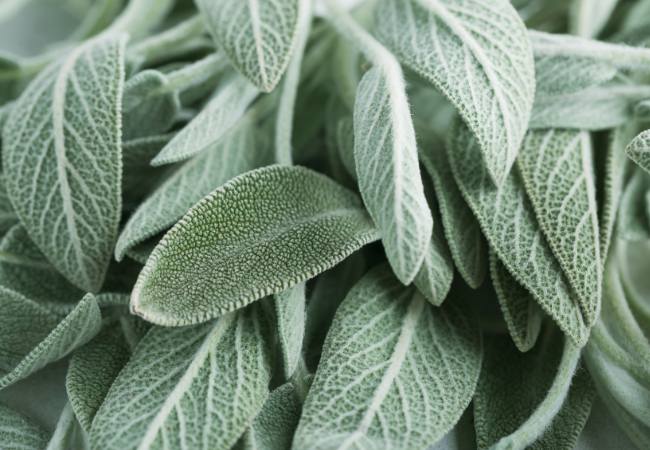
When it comes to sage, the magic is all in the leaves. Whether you’re using fresh, dried, or even burning them, these velvety leaves are packed with goodness.
The fresh leaves are the most commonly used part of the plant. They’re sturdy, aromatic, and rich in essential oils. When cooking, you can either use them whole for a subtle hint of flavour or chop them up to make their earthy taste even more pronounced.
For dried sage, the flavour becomes more concentrated, taking on a deeper, almost musky profile. This is perfect for seasoning hearty winter dishes that call for a bold, warming kick. Just remember—a little dried sage goes a long way!
And then there’s the smudging (photos below when you scroll). Burning dried sage bundles to cleanse energy is a ritual that dates back centuries. The smoke is thought to purify, calm, and reset the energy of a space, making it a popular practice in spiritual and wellness circles.
Quick Tip 🌿: If you’re burning sage for its cleansing properties, make sure you have a window open—let the old energy out, and allow fresh, positive vibes to flow in.
Healing Powers of Sage: Nature’s Little Remedy
Sage isn’t just about flavour or tradition—it’s also about healing. Known for its potent properties, this herb has long been a go-to for wellness and natural remedies.
1. Antioxidant Properties: Sage is packed with antioxidants, helping to neutralise free radicals that contribute to ageing and disease. It’s like having a little shield for your body—keeping things running smoothly and protecting your cells.
2. Anti-Inflammatory Relief: If you’ve ever had a sore throat, you may already know about sage’s soothing power. Sage tea or even a simple sage gargle can help ease that discomfort, thanks to its anti-inflammatory properties. Goodbye, irritation—hello, comfort.
3. Memory Booster: Feeling a bit foggy? Historically, sage has been used to improve focus and memory. Modern studies even suggest that sage can help boost cognitive performance. It’s like a gentle nudge for your brain, helping you think clearly.
4. Hormone Balancer: Sage is also popular among women as a natural way to support hormone balance, particularly during menopause. Drinking sage tea may help reduce hot flushes and night sweats, offering a bit of comfort when you need it most.
Quick Tip 🌿: To make a simple sage tea, steep a few fresh or dried leaves in hot water for 5-10 minutes. Add a squeeze of lemon or a bit of agave syrup for a touch of sweetness, and sip your way to wellness.
Using Sage: Everyday Ideas to Bring Its Magic Home
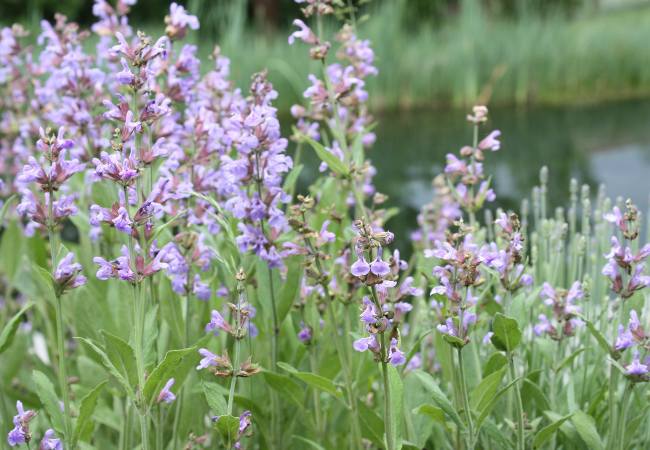
So, you’ve got some sage leaves—now what? This herb is incredibly versatile and can fit seamlessly into your kitchen, wellness rituals, and even beauty routines.
In the Kitchen
Sage is a kitchen staple that can transform everyday dishes into something extraordinary.
- Roasts: Add sage to roasted vegetables to enhance their flavour with its earthy warmth.
- Pasta: Fry fresh sage leaves in a little vegan butter until crispy, then toss it with pasta for a simple yet sophisticated dish.
- Herb Infused Oils: Infuse olive oil with sage leaves for a delicious, aromatic oil perfect for drizzling over soups or salads.
For Wellness
Sage isn’t just for flavour—it’s also great for well-being.
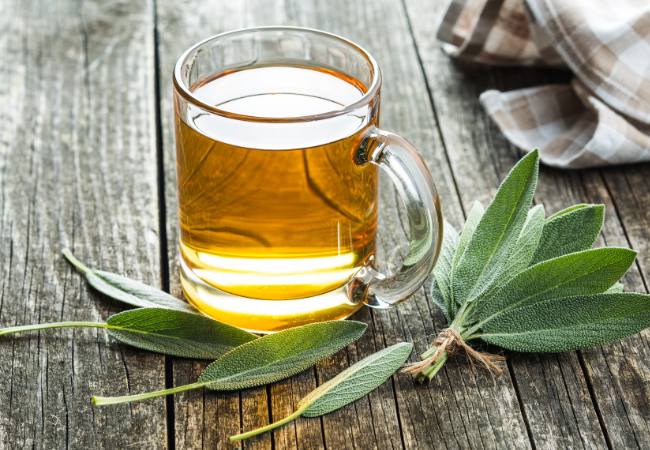
- Sage Tea: Brew sage leaves into a calming tea to help relieve indigestion or support hormone balance.
- Sore Throat Remedy: Make a sage gargle to soothe sore throats—just steep some leaves in hot water, let it cool, and use it to gargle.
- Cleansing Ritual: Burn dried sage to cleanse your space of negative energy, creating a sense of calm and renewal. Don’t forget to open a window to let the old energy out! More on this below.
Beauty and Skin Care
Sage can even find its place in your beauty routine.
- Facial Steam: Add fresh sage leaves to a bowl of hot water and use it as a facial steam to open up pores and refresh your skin.
- Hair Rinse: Sage can be brewed into a rinse to add shine to your hair and promote scalp health.
A Little Extra Magic
Sage has long been used for its mystical properties.
- Protection Spell: Place a few sage leaves under your pillow to ward off nightmares and bring a sense of peace to your sleep.
- Manifesting Intentions: Write down an intention, then burn it alongside a bundle of dried sage to help release your wishes into the universe.
Sage isn’t just a herb; it’s a companion that brings warmth, wellness, and a little extra magic into everyday life.
Sage’s Star Qualities: Active Compounds That Pack a Punch!
Sage isn’t just powerful because of its tradition and folklore—it’s backed by science, too. The magic lies in the compounds that make up its leaves, giving sage its unique healing properties and benefits.
1. Essential Oils: Sage is rich in essential oils like thujone, camphor, and cineole. These oils are what give sage its distinct aroma, but they’re also responsible for its antimicrobial and anti-inflammatory powers. That’s why sage oil can be so effective for skin health and purifying spaces.
2. Rosmarinic Acid: This is one of the most active compounds in sage, known for its strong antioxidant properties. It helps combat oxidative stress, which contributes to everything from ageing to immune health. Think of it as your body’s natural protector, ready to keep things balanced.
3. Flavonoids: Sage contains flavonoids like apigenin and luteolin, which have anti-inflammatory effects. These compounds help reduce inflammation, making sage a useful ally for soothing ailments like sore throats or aching muscles.
4. Tannins: Tannins are natural astringents, which means they can help tone tissues and tighten pores. That’s why sage is often used in skin care and as a natural remedy for minor cuts or to calm irritated skin.
Quick Tip 🌿: When using sage oil, always dilute it in a carrier oil like almond or olive oil to avoid skin irritation—especially if you have sensitive skin.
These compounds make sage more than just an herb; they make it a true healer, packed with the natural elements that help keep our bodies healthy and balanced.

Sage in Culinary Traditions: Flavouring the World One Dish at a Time
Sage’s uses in the kitchen are just as varied as its benefits. This herb brings a rich, earthy depth that finds its way into dishes all around the world.
I grow it outside (I wanted to upload a photo but my phone is out of storage, will try another time), and I have to say—I’ve always had a bit of a soft spot for it. There’s just something about sage that draws me in every time.
In Savoury Dishes
Sage has a special affinity for rich, comforting foods.
- Classic Stuffing: Sage is an essential ingredient in traditional stuffing recipes, lending its robust, savoury flavour to bread, onions, and herbs.
- Roasted Veg: Sage pairs beautifully with root vegetables like potatoes, carrots, and parsnips, especially when roasted to bring out their natural sweetness.
- Sausages: In many European cuisines, sage is often used in sausages to add warmth and complexity, complementing the richness of the meat.
In Sweet Creations
You might not think of sage when it comes to desserts, but its earthy sweetness can be an unexpected delight!
- Herb-Infused Agave Syrup: Infuse agave syrup with sage for a unique, aromatic sweetness perfect for drizzling over vegan yoghurt or adding to tea.
- Sage Shortbread: Add finely chopped sage to shortbread dough for a subtly herbaceous twist on a classic biscuit—delicious with a cup of tea! Just a note: I’m vegan so when mentioning these dishes will always mean their vegan version. Just sayin’.
Beverages with a Twist
Sage also finds its way into some delicious drinks, offering a herbal note that elevates the flavour.
- Sage Tea: A simple and soothing herbal infusion made with fresh or dried sage leaves. It’s great for digestion and makes a perfect evening wind-down. And oh-so-easy to make. Very hearty.
- Cocktails: Sage pairs surprisingly well with cocktails—muddle a few fresh leaves into your cocktail for a sophisticated, botanical note. Your friends will love it.
A Little Extra Flavour Tip 🌿: When cooking with fresh sage, remember it has a strong taste, so start small and adjust as needed. The leaves are robust enough to stand up to longer cooking times, which means they release their full flavour slowly, making them ideal for stews.
Sage is a culinary chameleon, fitting seamlessly into both the familiar and the unexpected. It adds not just flavour, but a touch of tradition, warmth, and comfort—making any dish feel a little more special.
**Italians use sage in their cooking, especially in plant-based dishes like sage-infused olive oil for drizzling over pasta or crispy sage leaves to garnish gnocchi. It pairs beautifully with roasted vegetables, stuffed mushrooms, or even vegan creamy sauces for a fragrant, earthy flavour. Sage is a versatile herb that brings a touch of Italian tradition to many vegan-friendly recipes. I had a friend who was living with an Italian lady who used sage almost every day in her cooking. Amazing.
Magical Uses of Sage: A Herb of Mystical Power
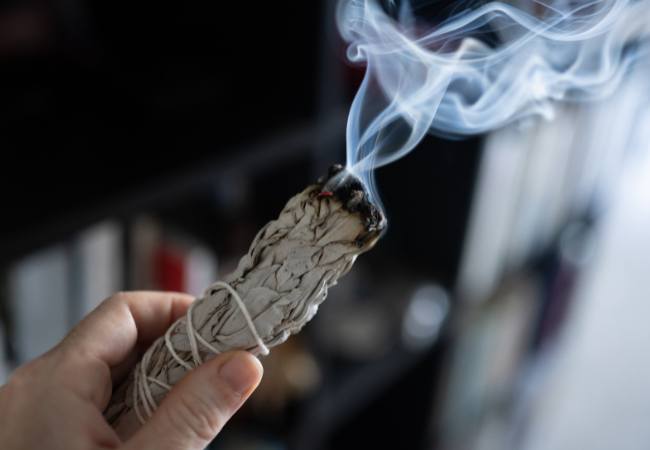
Sage isn’t just about flavour. Its magical properties have been cherished for centuries—burned to purify, used in rituals for wisdom, and even carried to ward off negativity.
Purification and Protection
You’ve probably come across those burning sticks online—they’re really popular in the wellness community.
- Clearing Negative Energy: The smoke is believed to remove negative energy, whether it’s in your home, a specific object, or even your own aura.
- Protection Rituals: Sage is often used to protect against unwanted influences. You can carry dried sage in a pouch or keep it in your home to promote a safe, peaceful atmosphere.
I’ve actually never tried it myself, but this is something I always wanted to do at home.
Wisdom and Clarity
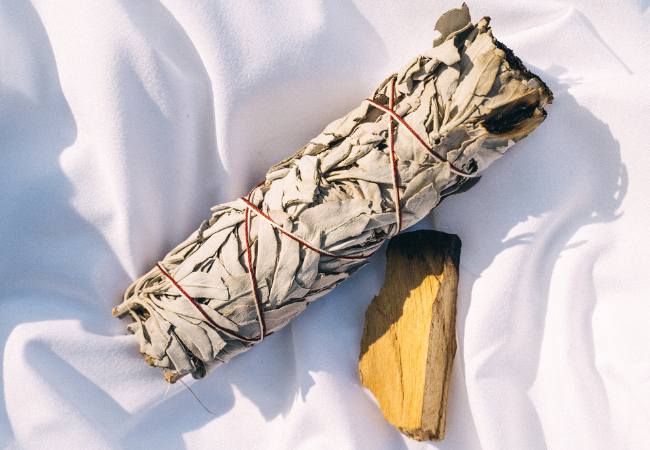
The very name of sage evokes wisdom, doesn’t it? It’s often used to promote mental clarity and focus.
- Meditation Aid: Burn sage during meditation to help clear your mind and create a sacred space. Its earthy aroma can help ground you, making it easier to connect with your inner self.
- Dream Work: Placing sage under your pillow is said to encourage vivid dreams and help recall them more easily. It’s also thought to keep away bad dreams, allowing for a more restful sleep.
Love and Attraction
Sage also has a gentle association with love and attraction. For those interested, check the below.
- Love Charms: Sage can be used in love spells or charms, especially when combined with other herbs like rosemary or lavender. It’s believed to help foster a deeper emotional connection.
- Manifesting Peaceful Relationships: Burning sage while setting intentions for peace and love in your relationships can help bring those energies into your life.
A Quick Magical Tip 🌿: Always set a clear intention before using sage in a ritual. Whether you’re clearing negative energy, seeking protection, or manifesting love, focusing on your purpose will help you make the most of this powerful herb.
Sage in Traditional Medicine: An Ancient Healer
We’ve already seen quite a lot regarding this little, lovely herb, but it has to be mentioned that sage has been cherished as a healing herb for thousands of years, with its use spanning multiple traditional medicinal practices—from ancient Egypt to Ayurvedic and Traditional Chinese Medicine (TCM).
Its powerful properties have earned it the nickname “the saviour herb,” and for good reason!
Traditional Remedies Across Cultures
- Ayurvedic Medicine: In Ayurveda, sage is used as a warming herb to balance the doshas, particularly Vata and Kapha. It’s thought to help with respiratory health, aiding in the relief of coughs and congestion.
- Traditional Chinese Medicine (TCM): In TCM, sage is often employed for its ability to move stagnant energy (Qi). It is used to harmonise the body’s internal energy, support digestion, and alleviate symptoms like bloating.
- European Folk Medicine: In Europe, sage has a long history of use for digestive health, helping with everything from indigestion to gas. It was also commonly used to aid in wound healing, with fresh leaves applied as a poultice to help speed recovery.
Sage for Modern Wellness
- Menopausal Relief: Sage is well known for its ability to help with menopausal symptoms like hot flushes and night sweats. A cup of sage tea can provide gentle support during times of hormonal change.
- Oral Health: Gargling with sage tea has been a trusted remedy for sore throats and gum inflammation. Sage’s antibacterial properties make it an effective natural mouthwash.
- Respiratory Health: Sage’s antimicrobial and anti-inflammatory effects make it a wonderful herb for respiratory support. Steam inhalation with sage leaves can help ease congestion and open up the airways.
Quick Health Tip 🌿: If you’re using sage medicinally, start with small amounts to see how your body responds. Always consult a healthcare professional, especially if you’re pregnant or have existing health conditions.
Safety First: How to Use Sage Without the Worries
Sage is amazing, but even the best herbs need to be used with a little care. Here’s what you need to know to keep your sage experience safe and happy.
Pregnancy and Breastfeeding
If you’re expecting or nursing, keep it simple—stick to using sage in your cooking. Sage contains a compound called thujone, and while a sprinkle in your stuffing is perfectly safe, higher doses like concentrated teas or extracts are best avoided during these times.
Essential Oil Dos & Don’ts
Sage essential oil is strong—think of it as the concentrated magic of the plant. It should always be diluted in a carrier oil (like coconut or almond oil) before you use it on your skin. Never use it straight up, and always do a patch test first. And remember, sage oil isn’t for internal use unless a pro gives you the green light.
Gallstones? Go Easy
Got gallstones? Sage might not be your best friend here—it can stimulate bile, which could make symptoms worse. Best to chat with your healthcare provider before diving into sage remedies if gallstones are in the picture.
Moderation is Key
A little sage goes a long way. Culinary amounts are totally fine, but don’t overdo it—especially when it comes to sage essential oil. Too much can lead to unwanted symptoms like dizziness or even a racing heart. Keep it balanced, and you’ll stay on the safe side.
Burning Sage for Cleansing
Sage burning (or smudging) is a beautiful way to cleanse energy, but remember to always keep your space well-ventilated. Inhaling too much smoke isn’t great for anyone, and it’s especially tough on those with asthma or sensitive lungs. Keep windows open, and never leave burning sage unattended—safety first, always.
Final Thoughts: Why I Think Sage Deserves a Spot in Your Life
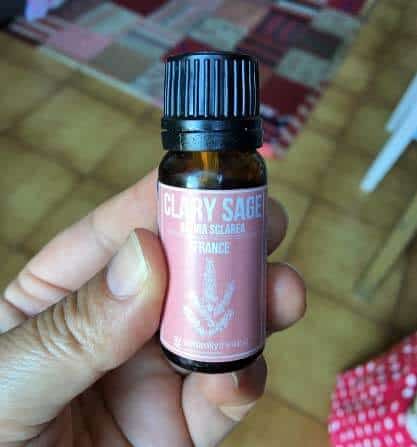
Sage isn’t just another herb; it’s an experience. Whether it’s flavouring your favourite comfort dish, helping you find calm during meditation, or clearing out stagnant energy from your home, sage brings a little bit of magic wherever it goes.
Think of sage as an old friend—one that has seen humanity through countless centuries. It’s a healer, a protector, and a teacher. From the smoky aroma that fills the air during smudging to the earthy flavour that makes a dish feel like home, sage is all about comfort, wisdom, and a deeper connection to the natural world.
Whether you’re adding a sprinkle to tonight’s dinner, brewing a calming tea, or lighting a bundle to clear your space, sage is here to bring something special into your everyday. The beauty of sage lies in its simplicity—just a few leaves can make all the difference.
Ready to welcome sage into your world?


I too was drawn to Sage, and I had a similar experience at the shop from which I purchased it. In its introduction to me, it was in an old looking and tatty box, and it was also the last one on the shelf. I wanted some herbal tea, but it didn’t even occur to me that Sage could be infused in a tea. I have only ever used it as incense, but the box indicated use as a tea. It made it’s presence to me at a time when I really needed foundation, grounding, fortitude and a prompt for some inner-reflection. I drank it each evening without realising that it was a good idea to do so. I would awake in a state of being able to think, I had inner resolve and insight. Whatever the major contributors actually were, I am grateful for Sage. Thank you for your informative and inspiring website.
What a lovely comment. You’ve made my day! : )